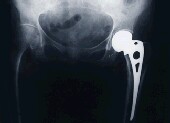
TUESDAY, March 11, 2014 (HealthDay News) — As the population ages, more and more older people might need to have their hip joints replaced. But how old is too old to undergo the surgery?
According to a new study, patients in their 90s who need total hip replacement can have results comparable to younger patients.
“Our data show that [older] patients have the ability to do better than we expected,” said lead researcher Dr. Alexander Miric, an orthopedic surgeon at Kaiser Permanente, in Los Angeles.
Over a 10-year period, Miric and his colleagues compared the results of hip replacement surgery in 183 patients who were aged 90 and above to the results of more than 43,000 other total hip replacement surgeries performed on younger patients.
“Being in your 90s need not disqualify you from having a hip replacement surgery,” Miric said.
He is scheduled to present the findings Tuesday at the annual meeting of the American Academy of Orthopaedic Surgeons, in New Orleans.
Hip replacement surgery, often needed because of the wear-and-tear arthritis known as osteoarthritis, has been done since 1960, according to the academy, but techniques have improved. About 285,000 total hip replacement procedures are done annually in the United States, according to the U.S. Agency for Healthcare Research and Quality.
Miric’s team looked at data collected by a total joint replacement registry. They analyzed hip replacement surgeries done from April 2001 through December 2011.
The researchers compared three age groups: younger than 80, 80 to 89 and 90 and older. They compared the lengths of the hospital stay, complications after surgery, death rates and readmissions to the hospital up to 90 days after the surgery.
Although none of the patients 90 and older had serious blood clots known as deep vein thrombosis, 1.2 percent of the those aged 80 to 89 did. Meanwhile, less than 1 percent of the younger patients did.
“Compared to those under 80, they did not have higher rates of infection,” Miric said of the patients over 90.
The oldest patients did stay in the hospital a bit longer: 3.4 days on average, compared to 2.8 days for the youngest patients and 3.3 days for the 80- to 89-year-olds.
The oldest patients also were more likely to be readmitted within the three months after the surgery.
And the oldest had the highest death rates within the 90-day follow-up period — 2.7 percent compared with 1.3 percent for patients aged 80 to 89 and 0.2 percent for those under 80.
Miric said the bottom line for nonagenarians with worn-out hips is optimistic: “If you are in your 90s, it is reasonable to have that conversation [about surgery] with your surgeon.”
The study results are not surprising, said Dr. Craig Della Valle, a professor of orthopedic surgery at Rush University Medical Center in Chicago. He reviewed the findings but was not involved in the study.
He, too, has performed total hip replacement surgery on 90-year-olds with good results, he said. “Most folks who live to 90 years old and have symptomatic arthritis are generally a pretty hardy crowd,” he said. “If they are healthy enough that their arthritis bothers them, it usually means they are active and can tolerate elective surgery.”
He cautioned, however, that patients of this age, as well as other ages, need a thorough preoperative evaluation to be sure they are good candidates for the procedure.
However, he said, the death rate of 2.7 percent found in the study for those 90 and above seems high.
In response, Miric said the one-year death rate of people 90 and above, in general, is about 20 percent. In his study, however, the one-year death rate of the 90-and-up group was 5.5 percent.
Because this study was presented at a medical meeting, the data and conclusions should be viewed as preliminary until published in a peer-reviewed journal.
More information
To learn more about hip replacement surgery, visit the American Academy of Orthopaedic Surgeons.
Copyright © 2025 HealthDay. All rights reserved.

